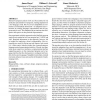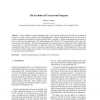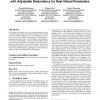300 search results - page 13 / 60 » Adapting Representation in Genetic Programming |
ICSE
2000
IEEE-ACM
13 years 11 months ago
2000
IEEE-ACM
Interactive program analysis tools are often tailored to one particular representation of programs, making adaptation to a new language costly. One way to ease adaptability is to ...
GECCO
2007
Springer
14 years 1 months ago
2007
Springer
In this paper, we provide an algorithm that systematically considers all small trees in the search space of genetic programming. These small trees are used to generate useful subr...
GECCO
2005
Springer
14 years 1 months ago
2005
Springer
We present a molecular computing algorithm for evolving DNA-encoded genetic programs in a test tube. The use of synthetic DNA molecules combined with biochemical techniques for va...
APIN
1998
13 years 7 months ago
1998
Process algebra are formal languages used for the rigorous specification and analysis of concurrent systems. By using a process algebra as the target language of a genetic program...
Publication
In this paper we describe a new class of representations for realvalued parameters called Center of Mass Encoding (CoME). CoME is based on variable length strings, it is self-adap...



